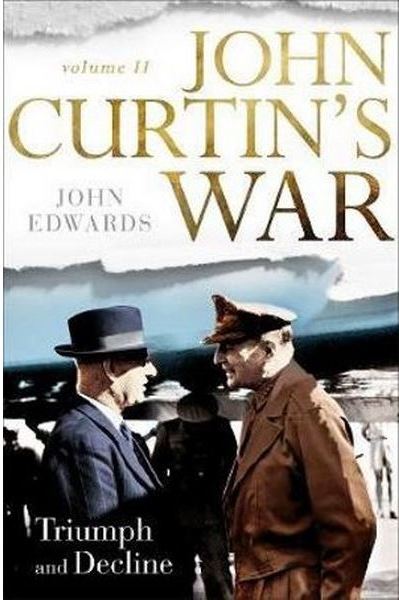This follows on from Vol I published last year.

Hardcover 512pp RRP $49.99
Much of the personal life and background to John Curtin was revealed in that volume, which concluded at the Fall of Singapore. This now takes up the narrative right through until his death in 1945.
If one were to be honest, this is not about John Curtin’s War. This is about Curtin’s interaction with MacArthur, Blamey, Churchill and FDR. There is little in the book about what was happening in Parliament. In fact, I struggle to recollect one passage where Curtin is in the House. Nothing is here about wartime problems such as miners’ strikes and wharfies’ go-slows. Nothing about the struggle to develop an integrated plan for the successful prosecution of the war. Little about the actual effect the war was having on Australia and it’s people.
One might even think after reading the book that Curtin was a President, as so little is shown of the workings of the War Cabinet. Politics rarely appears, although the 1944 elections do take a few pages. In such a time of great stress, there must have been some strains in Parliament, among the members of the Labor Party, even inside the Public Service. Yet the impression is that Curtin with Shedden sailed through the war without having to worry about rationing plans, the evacuation of the people or any of the many matters that required oversight and decisions made in wartime.
Having said that, what the book does well illustrate Curtin managed the various personalities who were fighting the war. It shows clearly the interactions, both good and bad, between Curtin, MacArthur, Blamey and the ever-present Shedden. It addresses, warts and all, the problems of competing personalities and the demands and stresses of a wartime coalition, especially when one is a very junior partner.
Most of the story is well known but placing it in a context that shows how it developed and shining a light on the egos and personalities of those involved does give these stories more depth. One is left feeling that MacArthur used Australia until we no longer suited him and then discarded. Hence the clambering for a role for Australian forces in 1945. Certainly, a large part of Curtin’s war was taken up in pandering to MacArthur and rightly or wrongly agreeing with his histrionics and self-boosting to gain more American resources for Australia.
Curtin had his foibles, fear of flying being one. But overall he comes out of this book as a capable and dedicated person, working under strain to do the best he can for his country.
Reviewed for RUSI by Bob Hart, March 2019
Contact Royal United Services Institute about this article.






